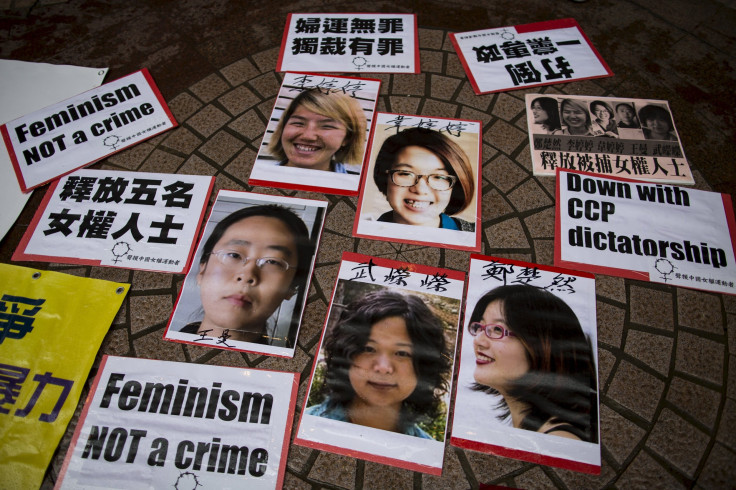China Releases Detained Feminists, But Concerns Over Clampdown On Civil Society Remain

Human rights groups, women’s rights activists and international organizations have welcomed China’s decision to free five feminist activists who have been held in detention in Beijing for more than a month. The five women were released on bail on Monday night, at the end of the statute of limitation on their further detention without formal charge.
Last week it was reported that police had sent details of their case to the public prosecutor’s office. However, lawyers for the women said early Tuesday that all five had been released, though they would remain on the equivalent of bail for another year.
The case has attracted global attention, not least because the five, Wu Rongrong, Zheng Churan, Li Tingting, Wang Man and Wei Tingting, were detained on the eve of International Women’s Day, apparently because they were planning peaceful demonstrations against sexual harassment of women on public transport. They were initially accused of "picking quarrels and provoking trouble," though the charge was later adjusted to "assembling a crowd to disrupt order in a public place," according to one of their lawyers.
The case had aroused particular incredulity because the detentions came as China’s legislature was about to review the country’s first draft law on domestic violence, one of the main issues on which the women had campaigned -- and also because China is due to co-host a Global Women’s Summit at the United Nations in New York in September, to mark the 20th anniversary of the U.N. World Conference on Women in Beijing in 1995.
One academic even suggested it was the first time China had detained women’s rights activists since 1913. Another feminist, meanwhile, likened the implications of their detention to the jailing of members of the Russian feminist band Pussy Riot.
Many international groups had called for the women’s release – particularly after it was revealed that at least one of them had reportedly been denied access to medical treatment. However, after Hillary Clinton criticized their detention last week, China’s Foreign Ministry warned foreign countries to keep out of the affair. And speaking after the release, Foreign Ministry spokesman Hong Lei insisted that China had not released the five as a result of foreign pressure, emphasizing that China was a country "ruled by law."
Yet some believe the threat of the U.N. summit, to be presided over by China’s President Xi Jinping, descending into farce, may have been a factor in the authorities’ relatively unusual decision to release people detained on public order charges. Leta Hong Fincher, an academic who interviewed Li Tingting for her book "Leftover Women: The Resurgence of Gender Inequality in China" -- and who recently told International Business Times that the women’s detention was “shocking and hypocritical” -- said the release showed that "China does care about its [international] image." Beijing would have faced a “major boycott” of the Global Women’s Summit if it had not freed the women, she added on Twitter.
International organizations welcomed the decision; the European Union Delegation in Beijing expressed “relief” at the women's release, and Amnesty International described it as an "encouraging breakthrough," though it also called on the authorities to “drop all charges and restrictions” against the five.
The women, who are all in their twenties or early thirties, have previously carried out activities including occupying men’s public toilets to protest at a lack of public facilities for women. They have also paraded in blood-spattered wedding dresses to raise awareness of domestic violence. However, their families – along with the boyfriend of one of the women and the girlfriend of another – last week emphasized in an impassioned letter to the Beijing government prosecutor’s office that the five “actively support our country’s national policy on gender.”
The women’s friend and fellow activist Zhao Sile, writing in Foreign Policy, said the women’s activities were generally "mild," and noted that China’s official Women’s Federation, which is the co-organizer of the U.N. summit, had asked them to help write a report for the event. However, she said that their efforts to take their appeals for women’s rights onto the streets and into the public domain meant they had a “tense relationship” with the police. Their detention may have occurred partly because their planned protests fell during the annual legislative session in Beijing, when officials are always under strict orders to maintain social order, she suggested; but added that she believed it was also "a continuation of the government’s crackdown on NGOs in China in 2014," arguing that in China’s current political climate, “no socially active organizations and individuals are welcome.”
Various observers have noted that, under Xi, the Chinese authorities have become, as one rights activist put it recently, “allergic” to members of the public taking action, even if these actions broadly support government policy. Nevertheless, many worry that this strategy will alienate modern civic minded people – like the 1,100 supporters of the five women who signed a petition calling for their release last week.
Leading feminist academic Li Yinhe, a member of the advisory body to China’s legislature, commented that the government’s strategy was self-defeating. “What you want is stability, but the result is instability and restlessness,” she wrote.
Hong Kong’s South China Morning Post said in a commentary on Monday that the Chinese authorities should “address the issues raised instead of penalizing the activists.”
Yet under Xi, the Chinese Communist Party – membership of which remains more than 75 percent male, despite attempts to address the gender imbalance in recent years – seems determined to take a tough line on social and political issues.
In the latest example, veteran female journalist Gao Yu, 71, is to go on trial this Friday on state secrets charges – accused of passing on information, about a government campaign aimed at combating western values and subversive ideas, to foreign media.
© Copyright IBTimes 2024. All rights reserved.






















